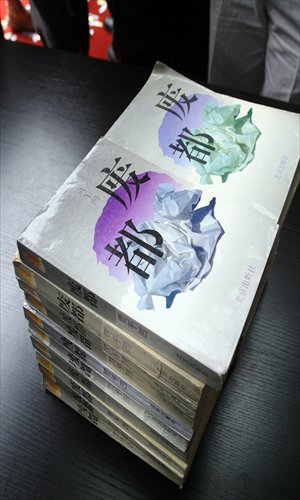 |
|
Copies of Fei Du Photo: CFP
|
Translation gap
The Abandoned Capital was translated into many languages, including Russian, French, Japanese and Vietnamese, and its French version by Genevieve Imbot-Bichet won the Prix Femina Étranger, a French literature prize, in 1997.
Before the English translation of The Abandoned Capital, only one novel by Jia had been translated into English. Fuzao, titled Turbulence by American sinologist Howard Goldblatt, won the Pegasus Prize for Literature in America in 1991.
Goldblatt said he once tried to translate another novel by Jia Pingwa called Qin Opera, but finally gave up because Jia used a lot of obscure dialect and idioms of Shaanxi province in the book, according to a report on the Xi'an Evening News in 2008.
Hu also mentioned about the difficulties of translating Jia's work into English, so he chose to cooperate with an English sinologist Robin Gilbank.
"If Robin cannot understand what I am trying to say, I will explain to him and he finally comes up with an idea of how to express it in English. Some of the idioms are hard to understand for English readers, and we will take a note to explain," Hu told the Global Times by e-mail, "Jia Pingwa was also invited to discuss the difficulties in translation with us, thanks to Mu Tao, executive deputy editor of Mei Wen magazine."
Jia asked Hu to retain every single sentence of the novel. Some netizens questioned the move saying that translation is a recreation by the translator, and too many requirements will make the translation even harder.
When asked about this, Hu said, "I don't think the request by Jia limits me, and I believe translation should keep the original flavor of the Chinese novel."
A literary predicament
The difficulty of translation is always a great barrier on the path of promoting domestic literature to the world.
Chinese readers will never agree that the country lacks great writers, but one has to admit that on a worldwide scale the impact of Chinese contemporary literature is quite limited. Even though Mo Yan won the Nobel Prize for Literature last year, the wave of Chinese literature going overseas did not really reach the expectations of Chinese publishers.
Hu said, when he visited America in 2003, he read The Reader's Companion to World Literature published by New American in 2002. In this 800-page book, only five Chinese writers (including foreign Chinese) were mentioned: Four of the five are ancient philosophers, such as Confucius and Zhuang Zhou, while the only contemporary writer, Gao Xingjian who won Nobel Prize in literature in 2000, became a French citizen in 1997.
"I have read some articles by so-called 'popular Chinese writers' overseas, who thought the only way to keep their market is by exposing the dark side of China in order to cater to the foreign readers' taste for novelty. However, I believe things will change with the constant deepening of China's opening up," said Hu, "we have to know our own country well if we want the Western people to know more about our modern life."
